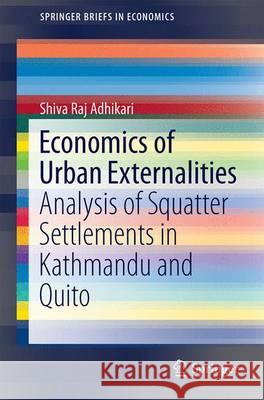Economics of Urban Externalities: Analysis of Squatter Settlements in Kathmandu and Quito » książka
Economics of Urban Externalities: Analysis of Squatter Settlements in Kathmandu and Quito
ISBN-13: 9789811005442 / Angielski / Miękka / 2016 / 83 str.
This book provides a fresh look at measuring negative externalities in the urbanization process. Meeting the challenges that come hand-in-hand with the contemporary age of rapid urbanization demands more extensive empirical knowledge. While most urbanization research focuses on positive externalities, this book is designed to offer insights into possible sources of negative externalities and the measurement thereof. In economics, the measurement of externalities is a challenging task that demands innovative research designs; however, previous research has failed to capture all of these externalities. The technique described in this book is carefully designed to measure negative externalities, particularly those related to squatter settlements that have been hitherto largely ignored by urbanization literature. The existence of negative externalities and the unintended consequences of rapid urbanization, particularly those related to squatter settlements, can be found in Latin America and Asia. This book provides comparative insights based on extensive primary surveys of households in squatter and non-squatter settlements of Kathmandu, Nepal and Quito, Ecuador. It is considered a case study that will improve the understanding of urbanization issues between Latin America and Asia. Societal benefits can be improved through the reduction of negative externalities. This book helps policy makers in Kathmandu and Quito fine-tune their policies to address the source of urban externality, as well as provide new insights into the nexus between urbanization and development. An investment in the reduction of negative externalities is profitable, thus presenting the government and international partners with a great opportunity. This book contributes to existing literature and will be useful for researchers and students.











